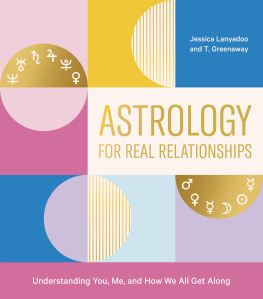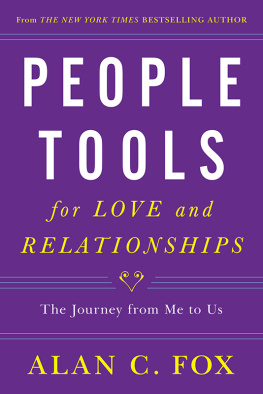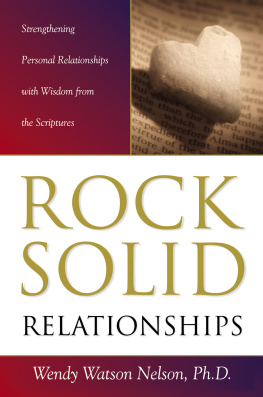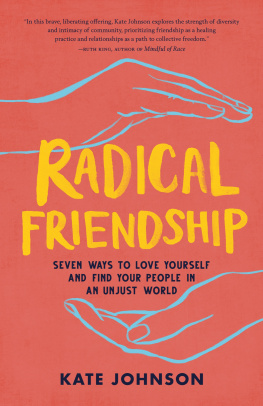Philip D. Halfacre
Midwest Theological Forum
Downers Grove, Illinois
Genuine Friendship is published by:
Midwest Theological Forum
4340 Cross Street, Suite 1
Downers Grove, IL 60515 USA
Phone: (630) 5418519
Fax: (331) 7775819
mail@mwtf.org
www.theologicalforum.org
Copyright 2008, 2010, 2014 by Rev. Philip D. Halfacre.
Digital Edition.
All rights reserved.
The editor of this book has attempted to give proper credit to all sources used in the text and illustrations. Any miscredit or lack of credit is unintended and will be corrected in the next edition.
Midwest Theological Forum ISBN 978-1-939231-22-2
Foreword
by Father Benedict J. Groeschel, C.F.R.
The human person is a fascinating creature. Our capacities both for good and evil seem endless. The pages of human history are filled with stories of many figures who stand out for their greatnessor for the opposite. We have all witnessed the life and death of Pope John Paul II and have seen reactions from people all over the world to the greatness of this man. Their words, tears, and presence in Rome during his final illness and in the days following his death were a powerful testimony. He had a remarkable ability to give. We also have examples of people whose memory is an everlasting shame and disgracepeople like Adolf Hitler and Joseph Stalin. Of course, the vast majority of us are not like either extreme. We are neither great saints nor dreadful sinners. A lot of us more or less schlep through life, doing the best we can with the circumstances we face.
We see a similar pattern in peoples relational lives. I am fortunate to know some people who are capable of being a good friend or a good spouse. Many of them also have a remarkable love for God. They are rather simple souls whom the world hardly notices, although those who really know them value their friendship. It is a joy for me to be with such people because they seem to have an easy time communicating their love and fulfilling their commitments to the people in their lives. They are the great lovers of the world, and they make it look easy because they do it so well.
Some people, however, do not make good friends, nor are they good spouses. The worst among them have a way of consuming people, using them for their own purposes. Others, without any malicious intent, neglect their responsibilities to the people in their lives. And some are so emotionally disorganized and have such underdeveloped relational lives that they truly do not know how to relate better than they currently do, though they often wish that they could. For many peoplemen and women, young and old, rich and poorthat area of life never really came together. They may be tremendously successful in other areas, but their personal relationships are not what they would like them to be.
It is important to remember that we can improve the quality of our personal interaction with others. We can love better. This is what the Gospel is about. My experience as a priest and as a psychologist tells me that people often want to improve the way they relate, but they simply do not know how. They feel like they are stuck in a rut. Perhaps you would describe yourself that way. Maybe that is why you have picked up this book. If so, you are in luck because the purpose of this book is to explain the basic framework of interpersonal relating, while giving practical suggestions for relating better. The author has done his work in a very competent and imaginative way. I have been studying relationships all my life, and I learned a number of things from this book.
This book is based on the fascinating idea that in all of our personal relationships, including marriage and our relationship with God, there is a basic underlying friendship that unites the persons involved. The quality of these relationships is determined by the way in which that underlying friendship is lived out. This is the genuine friendship that this book is about.
We refer to the experience of genuine friendship as intimacy. Many people seem to have an impoverished idea of intimacy and equate it simply with sexual interaction of some kind. Fundamentally, intimacy is a matter of people uniting with one another at a deeply personal level. That is why we can speak of intimate friendship and intimacy with God. Many saints have spoken of their intimacy with God, which touched them deeply within their soul and allowed them to experience his presence. Whether it is with ones spouse, with God, or with a friend in the ordinary sense, these genuine friendships come about when we make a sincere gift of ourselves.
Conversation and shared activities are important in establishing intimate friendships. Conversation need not be intense to be intimate, but it needs to be conversation about something, even if it is only about the events of the day. Years ago I visited a Carthusian monastery, where the monks live an austere life. I vividly recall a conversation with one of them about our respective spiritual lives. We spoke for a couple of hours, and it created a bond between us. Shortly afterward, I sat next to a well-meaning woman on a train who talked for two hours about absolutely nothing. Her prattling revealed a life of superficiality that made me wonder whether she was even capable of meaningful conversation. Paradoxically, meaningful conversationthe variety that genuinely unites peopleis the fruit of solitude, silence, and reflection. C. S. Lewis was right when he said, Those who have nothing can share nothing; those who are going nowhere can have no fellow travelers. We need not be particularly intelligent, creative, or articulate to establish genuine friendships. We simply have to be willing to share a part of our private lives. And it has to be done in a way that involves some sort of give-and-take. If you listen to the way people talk, however, you will notice that some people never really converse. They comment: on the weather, their favorite sports team, or their collection of ginger ale bottle tops. Or worse still, they perpetually complain. Certainly not every conversation between friends is a serious one, and friends do comment to one another about the events of their day. However, intimate relationships are founded on and sustained by conversations that involve mutual sharing and vulnerability. Developing the ability to relate this way and sharing what is deep within us is one of the fundamental tasks of early adulthood.
Relationships are a matter of communiona union togetherand linking people to one another. People can be linked in a variety of ways, but it usually includes some sort of psychological coming together, where we experience each others presence. It is the opposite of being alone and isolated. Members of a family or a real religious community can be said to experience this communion with one another. In his writings Pope Benedict XVI has often taken the idea of community and used it to interpret our spiritual relationship with Christ and his Church. Obviously this is to use the word communion in a comparative way. Using it in the most intimate way, we might say that mothers experience communion with their children even before they are born. Spouses, in particular, experience a union through deep emotional and psychological bonds.
I have found it interesting to observe spousal relationships from a psychological and relational point of view. Though united in a variety of ways, not all married couples would describe themselves as friends. I saw this many times among immigrant couples in the neighborhood where I grew up in Jersey City. I recall an old cobbler and his wife who lived near us. Every Sunday afternoon he would put on a business suit and his gray homburg. With gloves to cover his work-stained hands, and carrying his walking cane, he and his wife would take their weekly walk, but she was always nine or ten paces behind him. If she wanted to say anything to him, she had to shout. I find these relationships interesting. For the old cobbler and his wife, and for many of that generation, marriage was about simply fulfilling the expected roles of the husband/father and the wife/motherlittle more than a legal, contractual agreement. Perhaps that was the only way those immigrant people could survive. They often fulfilled their roles with extraordinary generosity and care, with dedication and appropriate self-forgetfulness, and in many ways they could serve as an example to todays generation. Yet marriages often bore little resemblance to what people today think of as friendship. It does not have to be one or the othereither a marriage of commitment and duty, or an emotionally satisfying marriage of intimate friendship. It can be both, though at times it may be experienced more like the one than the other. That is simply the nature of personal relationships. I am convinced that spouses who relate to each other like the best and dearest of friends are happier because of it. The idea of a husband and wife having a genuine friendship is a prominent theme of this book.












